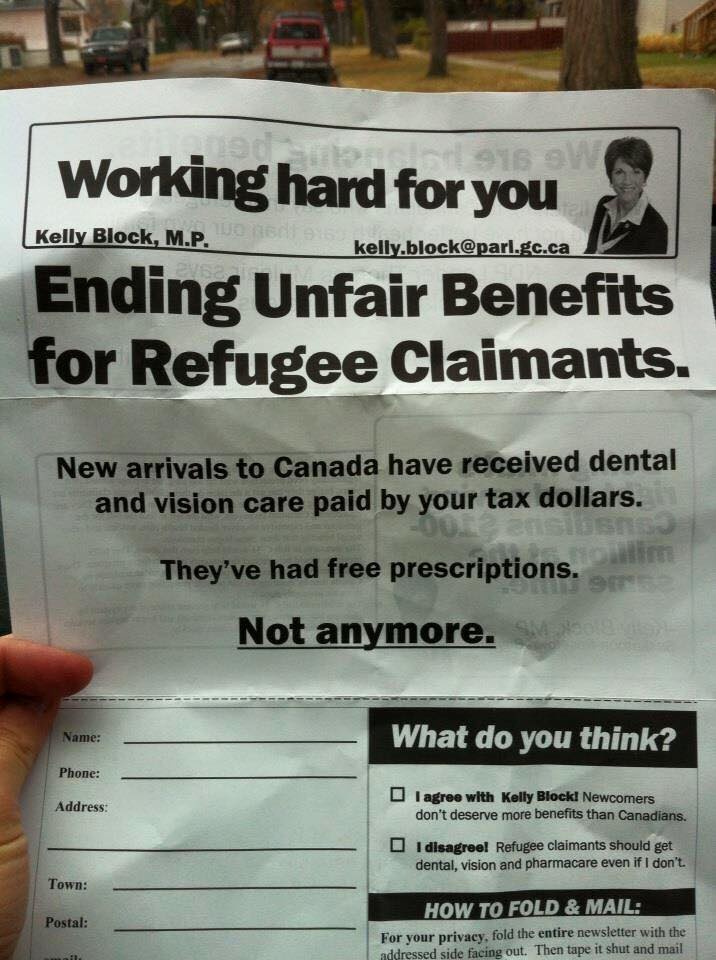For several years, the government of Prime Minister Stephen Harper has played to the worst instincts of a significant portion of its political base by selectively publicizing efforts designed to keep refugees, especially poor ones, from our shores.
Now Europe’s burgeoning humanitarian crisis has put this behaviour in the spotlight and the Harper government has found itself between a rock and a hard place.
Harper government anti-refugee measures include such activities foot dragging on refugee applications, favouring refugees based on religious affiliation, and a torrent of vilification aimed at refugee applicants, normally directed only to select audiences, that at times bordered on open bigotry.
Probably the most disturbing example was the Conservatives’ notorious 2012 decision to stop funding medical care, including pregnancy care, for refugees and their families. In June this year, medical professionals across the country protested against the government’s plan to appeal the 2014 decision of the Federal Court of Canada that the refusal to pay for refugee health care was unconstitutional. The Ontario government has argued the policy inevitably dumped many of the costs onto provinces.
Citizenship and Immigration Minister Chris Alexander’s spokesperson responded with the dubious claim health-care services received by refugees were superior to those for many Canadian citizens. “Failed asylum claimants and asylum claimants from safe countries no longer receive gold-plated health care benefits that are better than what Canadian taxpayers, including seniors, receive,” spokesperson Alexis Pavlich said last year. (As an aside, if this were true, it should tell you what, exactly?)
This cry was soon picked up by Conservative MPs in communications to their constituents, politicians like Saskatoon-Rosetown-Biggar MP Kelly Block who circulated a handout bragging she is “working hard for you” by cutting health services for refugees.
“I agree with Kelly Block! Newcomers don’t deserve more benefits than Canadians,” says a Russian-ballot survey in Block’s constituency newsletter, which was circulating vigorously on social media yesterday. The other potential answer, obviously the correct one from Block’s point of view, was “I disagree! Refugee claimants should get dental, vision and pharmacare even if I don’t.”
In the mean time, while this kind of thing may continue to play well in the redrawn Humboldt-Warman-Martensville-Rosetown riding, where Block is now the Conservative Party of Canada candidate, it is suddenly becoming a huge liability to the Harper government in many parts of Canada at a particularly inconvenient moment.
With a federal election looming on Oct. 19 and voters in large numbers deeply troubled by the heart-rending news coverage of the stream of refugees flowing into Southern Europe from the Middle East and North Africa, the Harper government finds itself with the urgent need to say two completely contradictory things at once.
This can be done when no one is particularly paying attention, but it is not so easy — as the slippery Alexander’s discomfiture during his now-famous interview with the CBC’s Rosemary Barton illustrated — when the public is starting to tune in.
In the wake of last week’s news coverage of the refugee crisis, large and growing numbers of Canadian voters are demanding that their government step up and act like an adult member of the world community, shouldering more of the hard work of easing the crisis as the Germans and Austrians are doing.
At the same time, the Conservative base continues to demand a hard-assed, unwelcoming approach to refugees, the rest of the world be damned.
Indeed, a recent public opinion survey indicated that, just as many of us long suspected, support for humanitarian openness divides along partisan lines — with vastly more self-identified Liberals and New Democrats in favour of accepting more refugees than Conservatives.
Conservative Party supporters and leaners were twice as likely as supporters of other parties to characterize refugees as “criminals or economic opportunists,” the Angus Reid Institute reported.
Still, the overall number of Canadians wanting to open the doors to the refugees has grown too big for the government to simply ignore.
At the same time, the vociferous but ever-reliable anti-refugee, anti-everything segment of the Conservative base is too determined to quit squawking about this just because it’s inconvenient to the government.
The prime minister has tried to bridge the gap by saying he wants to help, but that military action in the region is the best way to do so.
Alas for him, with many voters suspecting that as bad as many of the players seem to be, the West’s strategy of war-war-war in Iraq, Libya and now Syria may be what is making the crisis so bad, this does not really seem like as much of a panacea as it might if no one was really paying attention.
This is an unenviable — if completely deserved — position for Harper and his party to find themselves in.
My guess is that, wedged into this particular corner, the prime minister will run true to form and pander to his reliable base rather than risk doing the right thing. That should make the choice easier on voting day for the rest of us.
This post also appears on David Climenhaga’s blog, AlbertaPolitics.ca.



